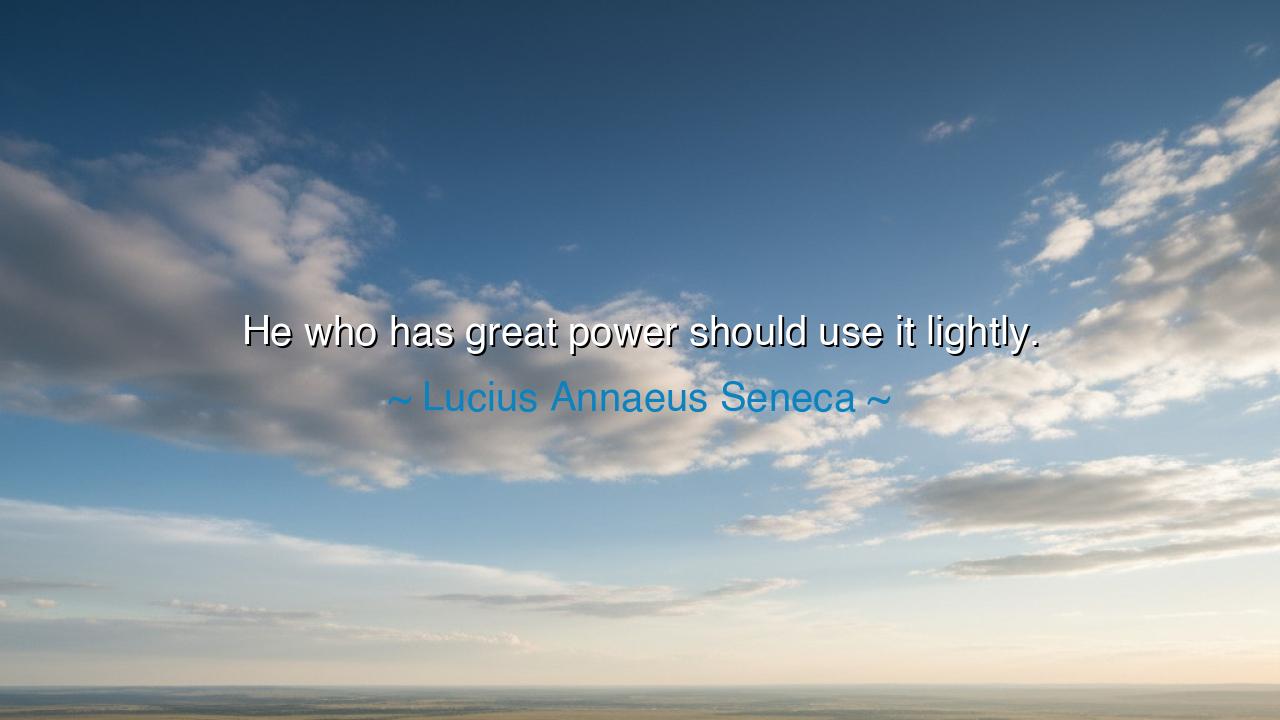
He who has great power should use it lightly.






"He who has great power should use it lightly." — Lucius Annaeus Seneca
These words, born from the heart of ancient Rome, carry the calm strength of a man who stood amid emperors and tyrants yet sought to master himself above all. Seneca, the Stoic philosopher and teacher of Nero, knew that power is both a crown and a burden — a force that can either uplift the world or crush it. To use power lightly is not to neglect it, but to wield it with grace, restraint, and wisdom. It is to understand that the greatest strength lies not in domination, but in self-control.
In the world of Rome, where ambition thundered through marble halls and swords gleamed in the name of empire, Seneca’s counsel was as rare as it was profound. He had seen how great power could corrupt the heart, how rulers who believed themselves gods soon became monsters. His student, Nero, began his reign as a golden hope — learned, cultured, and loved — but as power’s shadow grew, so too did his cruelty. Seneca, who had once guided him toward virtue, watched with sorrow as his pupil forgot the lesson of humility. From that tragedy was carved this timeless truth: that power without mercy becomes tyranny, and greatness without gentleness becomes ruin.
To use power lightly is to act as the sun does — strong enough to give life, yet never crushing those it warms. The truly powerful do not need to boast, threaten, or rage; their authority flows naturally, like a river that nourishes rather than destroys. The weak man, uncertain of his worth, uses his power to prove himself. The wise man, certain of his strength, uses it to serve. For as Seneca taught, “No man is great who cannot govern himself.”
History offers us luminous examples of this principle. Marcus Aurelius, another Stoic emperor, ruled the vast Roman world with both firmness and compassion. He commanded legions, yet meditated each dawn on patience and virtue. In the midst of war, he wrote not decrees of conquest, but reflections on kindness and the fleeting nature of glory. He bore the weight of an empire as one might bear a fragile child — not with fear, but with care. His power was immense, yet he used it lightly, as a man mindful that all authority is but a trust, and all thrones are temporary.
The lesson endures through every age. In our time, too, men and women wield power — in nations, in businesses, in families, even in the quiet dominion of influence. The danger remains the same: to let authority harden the heart. When power becomes pride, compassion withers. But when power is tempered with gentleness, it becomes a force for healing and justice. The one who uses power lightly walks in harmony with nature, for all things in the universe follow balance — the sea restrains its fury, the wind softens after the storm, and the strong tree bends so that it does not break.
Therefore, my child, if fate grants you power, carry it as you would carry a sacred flame — not flaunting its brightness, but guarding it from the winds of vanity. Speak softly even when your word is law. Act justly even when none can oppose you. Remember that power is lent, not owned, and that the measure of a ruler is not in his might, but in his mercy.
Let your strength be a shelter, not a sword. Let your authority be a balm, not a chain. In the end, the one who uses power lightly leaves behind no fear, but reverence; no destruction, but legacy. For the hand that rules wisely does not tremble with control — it opens with generosity, shaping a world that remembers not the force of command, but the grace of restraint.






AAdministratorAdministrator
Welcome, honored guests. Please leave a comment, we will respond soon